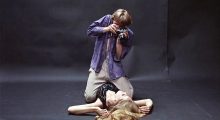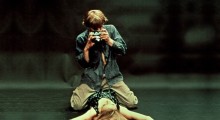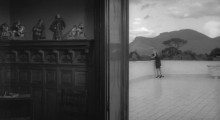Michelangelo Antonioni
-
Blow-Up, Being There and The Last Tycoon: Jim Hemphill’s Home Video Recommendations

Two very different but equally essential classics find their way to Blu-ray and DVD this week courtesy of the Criterion Collection, which has issued exemplary special editions of Michelangelo Antonioni’s Blow-Up (1966) and Hal Ashby’s Being There (1979). The Antonioni film, in which a fashion photographer finds evidence of a murder in one of his stills, heavily influenced later American political thrillers like The Conversation and Blow Out in spite of the fact that Blow-Up itself is less a mystery than an anthropological document of swinging ’60s London. It was Antonioni’s first film outside his home country after L’avventura, La Notte, […]
by Jim Hemphill on Mar 24, 2017 -
No Mimes, Please! Soderbergh Recuts Antonioni’s Blow-Up

“For legal reasons, all of the footage with the mime troupe will have to be excised,” writes MGM “executive receptionist Tureen Patarga” to one Michelangelo Antonioni about his movie, Blow-Up. “Apparently one of the striped shirts worn by a cast member was originally created by the noted designer Hermoine Girth-Schnitt and was not cleared for use by the costume department.” Any on-set producer, particularly on a low-budget picture with lightly-staffed departments, has experienced that morning-of irritation: “Hey, is this okay to use? Can we clear this?” Usually it’s a rock-star poster, a t-shirt, or some ambiguous knick-knack foregrounded in the […]
by Scott Macaulay on Aug 29, 2015 -
Michelangelo Antonioni on the Utility of Mystery

Michelangelo Antonioni’s work is known for, in addition to many other things, a certain open-endedness in its exploration of theme and narrative. But, you may be surprised to learn that the writer/director could be a bit more on-the-nose in his scripts. At Dangerous Minds, Paul Gallagher references a 2005 interview in The Guardian with Peter Bowles, who plays a drunk partygoer in Antonioni’s Blow-Up. In the original script, he had a monologue that nailed the themes of the movie. However, before shooting, Antonioni decided to cut it. The actor, feeling the speech was “essential to the film,” confronted Antonioni, pleading […]
by Scott Macaulay on Mar 5, 2014 -
Antonioni and Robbe-Grillet on Modernism, L’Avventura and Blow-Up

There’s a case to be made for viewing any old film in the theater, but few seem to demand the widescreen format like the work of Michelangelo Antonioni. Every frame of L’Avventura, the first entry in his monumental early 60s trilogy, is unusual and breathtaking in its construction. In the above video, fellow filmmaker Alain Robbe-Grillet (screenwriter of Last Year at Marienbad) discusses how Antonioni’s rejection of meaning and a closed-circuit narrative defined the Modernist aesthetic. Positioning him against the plot heavy Hitchcock, Robbe-Grillet notes the elusiveness of Antonioni’s intentions: “What you see is very clear, but the meaning of the images in constantly […]
by Sarah Salovaara on Feb 26, 2014 -
Six Asides on Paranormal Activity 2

Paranormal Activity 2 is not an avant-garde film, but only because no one has argued that it is. 1. The Importance of Framing The difference between commercial culture (pop culture) and the avant-garde is a matter of rhetorical framing. Jean-Luc Godard, for instance, created the conditions for the New Wave not only through his films, but through his words about his films, and about cinema in general. Confrontational, witty, manifesto-like, Godard framed the way people saw his films. Godard was an auteur of language, not just cinema. “A movie should have a beginning, a middle, and an end,” he famously […]
by Nicholas Rombes on May 10, 2011 -
ANTONIONI ADAPTED FOR THE STAGE
Those in London the first week of February can witness the Toneelgroep Amsterdam theater company’s stage adaptation of three films by Michelangelo Antonioni. From the Barbican Theater’s website: Love affairs, isolation, heartache. Internationally renowned theatre director Ivo van Hove leads his powerful ensemble in an exploration of award-winning, Italian film director Michelangelo Antonioni’s groundbreaking 1960s film trilogy (L’Avventura, La Notte, L’Eclisse), in this epic adaptation for the stage. Simultaneously performed, filmed and projected onto a giant screen, the show reinvents Antonioni’s portraits of bourgeois relationships in public and private settings. Multiple perspectives provide an intimate and visceral insight into the […]
by Scott Macaulay on Jan 9, 2011 -
The Perfect Swan
(Editor’s Note: This essay contains spoilers.) In literature or in oratory, where rhetoric arose from, it’s somewhat difficult to separate the argument’s mode of persuasion from its substance. In order to make an entirely skilled rhetorical point, the writer or speaker will have to present a series of assumptions and assertions, facts and hypotheses, in such a way that makes the argument’s substance apparent. That’s why literature lends itself to the intellectual: it’s founded upon a progression of ideas. Cinema is often referred to as a different kind of linguistic medium (the “language of film”), but a linguistic one nevertheless, […]
by Zachary Wigon on Dec 10, 2010 -
NEW CHANCE FOR OLD MOVIE : ANTONIONI’S LE AMICHE
Literally translated as “The Girlfriends,” Michelangelo Antonioni’s Le Amiche was made in 1955, but never given a proper US release. A restored print by Cineteca di Bologna arrives at Film Forum next week in New York and will play DC, LA and beyond, courtesy of an exquisitely curated new distribution company, The Film Desk. Reported features of the movie: a picnic by the sea that foreshadows L’Avventura; a collection of deep, and deeply troubled, female characters; a tea party — this is much more than a completionist’s dream come true!
by Alicia Van Couvering on Jun 11, 2010
